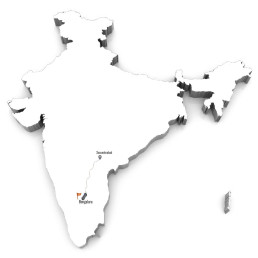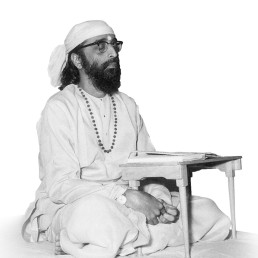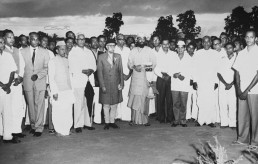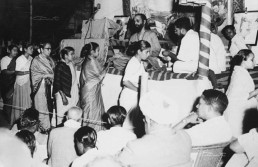
Jnana Yajna 72

Year & Dates:
August 07, 1960 to August 31, 1960

Yajna Topic:
Shrimad Bhagavad Gita- Chapter 3

Place:
Bengaluru, India.
Bengaluru had already hosted seven jnana yajnas of Pujya Gurudev’s but its spiritual appetite was far from being whetted. So, on the inaugural day of August 7, 1960, the large pandal already felt inadequate as thousands of seekers rushed for a spot in the front row to listen to Pujya Gurudev once again. At 6:20 pm, He strode in like a spiritual colossus with His Highness, Maharaja Sir Mohan Shamsher Jung Bahadur Rana of Nepal. After the Elayaraja of Travancore and the Chief Minister of Mysore, Sri B. D. Jatti joined Pujya Gurudev on the stage, the 72nd Jnana Yajna opened on a regal note. The Rana of Nepal appreciated how the third chapter of Shrimad Bhagavad Gita was an apt choice by Pujya Gurudev, since it would disclose the glorious secret of action that would benefit the sizable population of factory workers in Bengaluru.
Karma with the Right Motive
Wondering if he even had the qualification to inaugurate Pujya Gurudev’s Gita Jnana Yajna, the Chief Minister Shri B. D. Jatti, said, “If, as stated in the Gita Dhyana shloka, the Upanishads are the cow, Arjuna is the calf and Vasudeva is the cowherd, then Swami Chinmayananda is the milk-boy who brings the ‘Gita milk’ to our door. In the present Yajna, Swami Chinmayanandaji will discourse on the third Chapter of the Gita which deals with the Path of Right Action or Karma Yoga. It is a Chapter in which Lokamanya Tilak found the quintessence of the Gita. I am sure that since action is the very essence of life, we are all eager to know what exactly is the path of Right Action.”
After three reverberating chants of Om, Pujya Gurudev began, “Man cannot remain without acting. Act he must, rightly or wrongly. On analysis we find that action is propelled by thought, good or bad. As one thinks, so he acts. Action remaining the same, we call it good or bad according to the thought and motive behind the limbs of action.” He outlined how actions differ in their qualities and urged aspirants to rise above selfish motives to achieve the perfection that brings glory to all.
From August 8th morning, Pujya Gurudev carried the audience of Bengaluru to an added realm of bliss when He brought out the extraordinary wisdom of Kathopanishad in another huge yajnashala constructed in Kaadu Malleshwara. He began His upanishadic discourse saying that religion, rightly pursued, beautified the individual and uplifted the society.
The yatra for the 72nd yajna was to Srirangapatna and Melkote, on the 27th August 1960.
Boarding nine buses and a fleet of cars all adorned with the fluttering saffron Om flags, about 400 devotees followed Pujya Gurudev who explained how a yatra is a reflective journey of utter simplicity and devotion away from the mundane. The hearts of the devotees were in ecstasy with the satsangas with Pujya Gurudev, their holy dip in the Pashchimavahini river, and worship at the Lord Ranganatha temple at Srirangapatna and Lord Narasimha at Melkote temple. Throughout the yatra as in His yajnashala, Pujya Gurudev showed how actions become divine when dedicated to an altar.
Photo Gallery

“Think,” Says Pujya Gurudev
It is obvious that the productivity that is dormant in any situation can be invoked only by man’s sincere efforts. This potential which generally lies dormant everywhere is the Deva to be cherished by the worker through the Yajna activities, and certainly, it is sure that the Deva will manifest in turn to cherish or to bless the worker. “Thus cherishing one another, man shall gain the highest good,” is the Divine intention, in the mind of the creator, says Krishna in this stanza.
This Law of Seva is faithfully followed by every sentient and insentient member of the cosmos instinctively. Man alone is given the freedom to act as he likes and to the extent he disobeys this Universal Law of Sacrifice, Yajna, to the extent he comes to suffer, not because there are no joy content in things and situations, but because he with his arrogant and egoistic actions brings a discord in the harmony of the existence around him.
From Tyagi Magazine
No Guru, No God can help You!
True goodness comes from personal choice and effort, not merely external influence. Teachers and mentors can offer guidance and nourishment of positive thoughts, but true transformation requires internal digestion and assimilation of these teachings. Superficial changes do not cleanse the inner self; true beauty in action stems from a deep, inner transformation.


